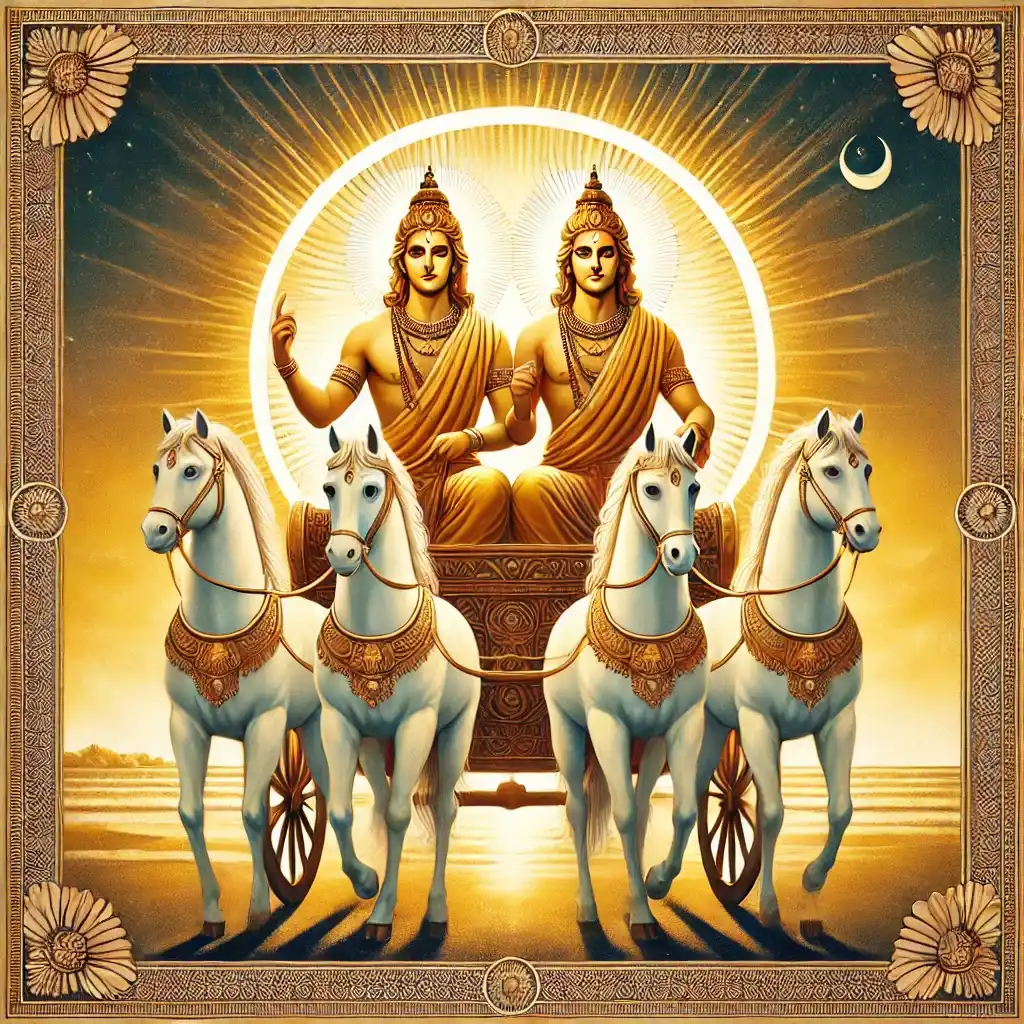
Spiritual Guidance and Inspiration
The Twin Horsemen of Vedic Mythology
The Ashvins
In the rich tapestry of Vedic mythology, the Ashvins (also spelled Ashwini or Aswins) hold a special place as the twin horsemen who embody the concepts of health, healing, and light. Known for their youthful vigor, these divine twins are among the most celebrated deities in Hindu literature, often associated with dawn and the ushering of light into the world. This blog delves into the origins, attributes, significance, and depictions of the Ashvins, providing an insightful and engaging exploration of these fascinating figures.
Origins and Identity
The Ashvins are mentioned in several ancient texts, including the Rigveda, one of the oldest known scriptures in the world. They are depicted as sons of the sun god Surya and his wife Saranyu (or Sanjna). In some versions of the mythology, they are the offspring of the sun and a mortal woman or a goddess in the form of a mare, which highlights their connection to horses.
Their names, often given as Nasatya (the "Not-Untrue" or "Giver of Help") and Dasra (the "Accomplished" or "Enlightener"), reflect their role as divine physicians and bringers of truth and light. The Ashvins are also linked to the concept of duality, representing the dual forces of light and darkness, day and night, and health and sickness.
Attributes and Roles
The Ashvins are revered as the divine physicians of the gods. They are known for their miraculous powers of healing and their ability to bring rejuvenation and renewal. In the Rigveda, there are several hymns dedicated to the Ashvins, praising them for their swiftness, their golden chariot, and their benevolent deeds.
They are often depicted as youthful, radiant beings, riding a golden chariot drawn by horses or birds. This chariot is said to move swiftly across the sky, heralding the dawn and dispelling the darkness of the night. Their connection to the dawn links them to the goddess Ushas, with whom they share the task of bringing light to the world.
Symbolism and Cultural Significance
The Ashvins symbolize the dawn of a new day, the transition from darkness to light, and the restoration of health and vitality. They are associated with the life-giving forces of nature and are invoked for protection and healing. In many hymns, they are called upon to rescue devotees from peril, cure diseases, and grant longevity.
In some interpretations, the Ashvins represent the dual nature of human existence, balancing the forces of life and death, health and illness, and light and darkness. They are seen as protectors of travelers and are often invoked in times of crisis, making them important figures in Vedic rituals and prayers.
Worship and Depictions
Worship of the Ashvins has been a part of Vedic rituals since ancient times. They are often invoked in the early morning hours, just before the break of dawn, when their presence is believed to be most potent. The rituals dedicated to them are meant to invoke their blessings for health, prosperity, and protection.
In artistic depictions, the Ashvins are usually shown as handsome, youthful twins, riding their golden chariot. They are often accompanied by animals, particularly horses, which symbolize their swift and powerful nature. Their chariot is described as moving with incredible speed, crossing the skies and bringing light to the world.
The Ashvins in Later Hinduism
In later Hinduism, the Ashvins continue to be revered, although their prominence has diminished compared to other deities. They are still acknowledged as divine healers and protectors, and their stories are retold in various Puranas and other Hindu texts.
Their connection to Ayurveda, the ancient Indian system of medicine, is also significant. As divine physicians, the Ashvins are often invoked in medical practices and rituals aimed at healing and rejuvenation. Their role in the early Vedic period as symbols of light and health has evolved, but their essence remains an integral part of Hindu mythology and spiritual practice.
Conclusion
The Ashvins, with their dual nature and divine attributes, offer a fascinating glimpse into the complex world of Vedic mythology. They are symbols of health, light, and protection, embodying the timeless themes of renewal and the triumph of good over evil. Their stories, hymns, and rituals continue to inspire and guide devotees, making them enduring figures in Hindu culture.
As twin horsemen who bring the dawn, the Ashvins remind us of the eternal cycle of life and the importance of balance and harmony in our existence. Their legacy as divine healers and protectors continues to be celebrated, ensuring that their light shines brightly in the annals of mythology and beyond.

Explore the latest and most popular products available on Amazon, handpicked for your convenience! Whether you're shopping for tech gadgets, home essentials, fashion items, or something special, simply click the button below to view the product on Amazon. We’ve partnered with Amazon through their affiliate program, which means that if you make a purchase through this link, we may earn a small commission at no extra cost to you. This helps support our site and allows us to continue providing valuable content. Thank you for your support, and happy shopping!